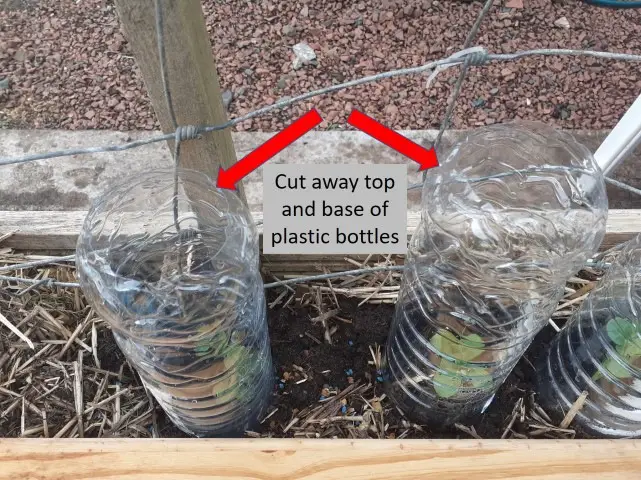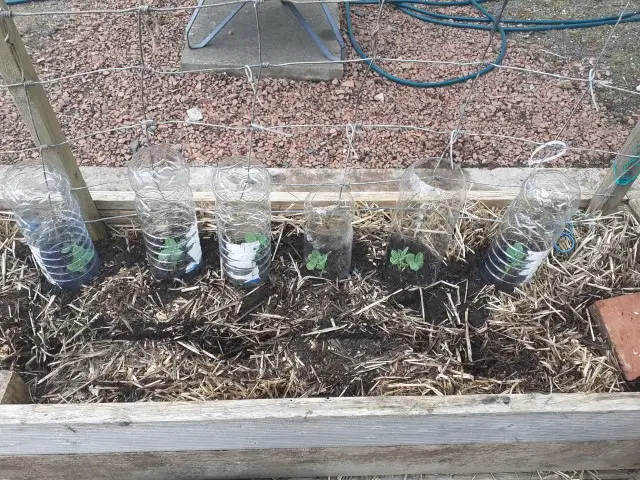There are many garden pests that have to be overcome in the process of growing your own peas, beans, and indeed many other vegetable crops. But protecting the young pea or bean seedlings from mice or voles is a top priority particularly if you live in an area close to fields or other agricultural crops.
For myself, I stay in such an area. I am surrounded by fields on all sides which are routinely planted with arable crops, which I am convinced is the main source of the field mice that routinely devastate my young pea or runner bean plants as soon as I plant them.
That was until a few years ago, when I discovered a simple solution that works almost every time! And here it is..

The ideal solution to stop mice eating pea and bean plants
A simple plastic water bottle! Cut away the top of the bottle to leave a wider opening than just the spout – this leaves enough inward-facing plastic to keep the bottle strong. Cut away the complete base and serrate with scissors to form a jagged edge then sink in place over the young pea plants – Job Done!
In the images you will see that the young pea plants have been planted in straw bales. This makes it very easy to sink the open end of the base into the compost surrounding the plant.
By sinking the base an inch or 2 into the soil it helps discourage the mice from eating the pea seed itself before it’s even germinated, if you are just planting seeds straight into the ground.
I prefer to plant young pea seedlings just to give them a better start, but this is mainly a matter of choice.
As for how this stops the mice from eating the young seedlings, this happens in 2 ways. Firstly the mice cannot climb up the slippery surface of the plastic, and secondly it acts as a deterrent more than anything and stops ‘casual’ nibbling of the shoots just because they can!
To be honest, this is not as effective against rats and if the mice were really determined to munch on your seedlings then they could just climb the supporting canes – or in this case wire mesh, and drop down into the inside where they could later dig themselves free.
The good news in my own experience, is that they just do not do that – or at least haven’t so far!

Seedling Protection against weather damage
This is another aspect of growing seedlings in plastic bottles such as these – they also protect the young plants against inclement weather. This is especially important in the early Spring when snow and sleet flurries are still common and can devastate a young plant.
Where I live is quite exposed to the weather, and so I notice an immediate improvement in growth rate when I enclose the young plant in a plastic bottle shelter.
This also acts like a mini greenhouse that raises the temperature inside the bottle where the pea or bean seedling is very soon reaching out of the top and climbing the framework.
For the record, the bottle is not removed at all, but is left in place for continued protection throughout the lifetime of the plant.
An organic solution to mice destruction
I have to admit that I am getting a little ‘soft’ as I get older, and place more value on life of all kinds than I used to ‘back in the day’ and this includes even the humble field mouse.
If I can find a way to get rid of my enemy without actually doing them any harm, then I will do so. However if not….that is another story perhaps!
But back to the bottle solution. In effect this is perhaps one of the best nature-friendly approaches to mouse problems as it does not involve poison or traps of any kind. The destructive mice are merely discouraged to eat the valuable runner beans and instead go elsewhere for their snacks!
Ok so maybe it doesn’t look so great – but it does the job, and that’s good enough for me.
Summary:
So there you have it, a simple but effective way to deter both rats and micefrom destroying your young pea or bean plants before they have even started to grow properly.
Of course this will not protect the older plants when they grow above the top of the bottle, or indeed the pea pods themselves when they start to form. However I have to say that I have never found this to be a problem.
Maybe a few mature pea pods or beans will be lost due to predation through the season, but the numbers are usually very small and perhaps a price that I for one am happy to pay to the natural world – just so long as the loss is sustainable!


